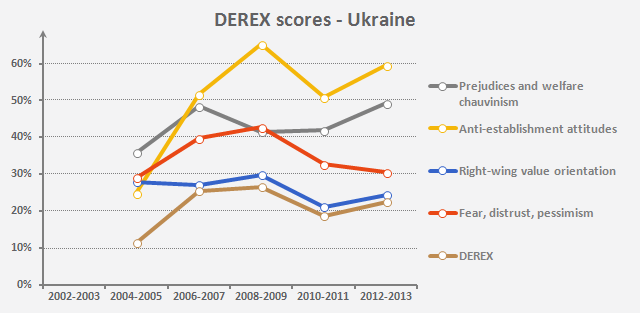Ukraine
Factsheet
| ETHNIC MINORITIES: | |
|
Russian: Belarusian: Roma: Moldovan: Crimean Tatar: Bulgarian: Hungarian: |
17.3% 0.6% 0.57% 0.5% 0.5% 0.4% 0.3% |
| RELIGIONS: | |
|
Ukrainian Orthodox: Greek Catholic: Roman Catholic: Protestant: Muslim: |
83.7% 8% 2.2% 2.2% 0.9% |
| NET MIGRATION: | -40,000 |
| POP. GROWTH RATE: | -0.2% |
| GDP GROWTH: | +0.2% |
| GDP PER CAPITA: | 3,867 |
| UNEMPLOYMENT: | 7.5% |


All-Ukrainian Union «Svoboda» (Всеукраїнське об’єднання «Свобода», Svoboda)

The Social-National Party of Ukraine (SNPU) established in 1991 is considered the forerunner of the party. Since 2000, the SNPU has been cooperating with EuroNAT (European Association of Nationalist Parties). At its February 14, 2004 Congress, the organization assumed its current name, Svoboda, and elected Oleh Tiahnybok as its first chairman. The popularity of the party increased steadily between 2007 and 2013. Due to the country’s ethnic division (Western Ukraine: Ukrainian majority, Eastern Ukraine: Russian majority) in the 2012 elections it received 30-40% of the votes in the Western regions and only 1% in the East. With a good showing at the polls it became the fourth largest party in the legislature with 37 seats in the 450-strong Ukrainian parliament. The organization’s philosophy is based on a work written by Yaroslav Stetsko in 1951, The two revolutions. Svoboda's rhetoric is defined by two major components: a rejection of Western-type democracies and strong anti-communism, linked together by an emphasis on Ukrainian national independence and xenophobia. In a typically East-European fashion, the radical party blames “Jewish conspiracy” both for exploitation by Western-type democracies and oppression by Eastern communist dictatorships and primarily Soviet-era Russian imperial ambitions, mixing socialistic and fascistic components. With the party's anti-Semitic slurs and the openly-admitted national socialist roots of its forerunner organization, the party is clearly classified as a far-right radical organization. Svoboda is a member of the European Association of Nationalist Parties. Despite its anti-western rhetoric, the organization plays an active role in the wave of demonstrations that followed the rejection of the EU partnership and cooperation agreement, dividing the Ukrainian public opinion and leading to the resignation of President Yanukovich.
Svoboda on the Internet:
Source:
- Political Capital
Our thematic websites
Political Capital's analyses and activities in English.
Research and advocacy programme focused on the role conspiracy theorising plays in shaping populist and radical politics.
Our project New electoral system in Hungary: watchdogging, advocacy and raising awareness focuses on the electoral reform in Hungary.
Our blog on political and societal extremism and conspiracy theories.
DEREX website is supported by











